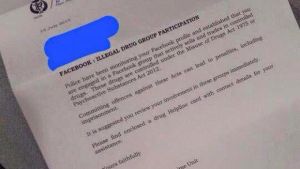Police Warn Facebook Drug Dealers They're Being Watched
July 22, 2015 | Drug Crime
Police have been snooping on people's Facebook profiles, and using the evidence to carry out drug raids.
The monitoring has been exposed by members of a blackmarket Facebook group, who complained of receiving letters out of the blue from police, warning them they were being watched.
One unidentified user received a letter from the Canterbury Organised Crime Squad, dated July 15, warned that their membership of a group suspected to be aiding illegal drug deals had been noticed.
They might wish to "review" their membership of the group, the letter suggested – and it had a card for a drug abuse helpline stapled to it.
"Police have been monitoring your Facebook profile and established that you are engaged in a Facebook group that actively sells and trades in controlled drugs," the letter said.
"Committing offences against [drug laws] can lead to penalties, including imprisonment."
Police confirmed on Monday that they were monitoring social media pages, and sometimes using the evidence they found to mount raids.
The letter from police did not make it clear which Facebook group was being watched, and police would not say.
But it warned the recipient the page in question was suspected to be operating a black market in breach of drugs and psychoactive substances laws.
Popular Facebook buy and sell pages such as "Hustle Live" have attracted criticism previously as police found people were trading stolen and illicit goods on the forums.
"Anyone who is using the internet to sell or distribute controlled drugs should think twice, as police are determined to disrupt these activities," Detective Senior Sergeant Jason Stewart, of Canterbury, said.
"We recognise addiction to controlled drugs contributes to crime. This is about encouraging addicts to seek help and break the cycle of crime."
The letter was generating plenty of online debate on Monday about whether police monitoring of social media activity amounted to a breach of privacy.
Some said those "stupid" enough to buy and sell drugs online deserved to get caught. "Nothing is safe or private in the cyber world, people. Some people are just idiots," one Facebook user wrote.
Stewart said: "The internet is a public space. We follow up on these Facebook pages when we become aware of them and follow through with letters, visits and in some cases search warrants."
Police national headquarters said "it's safe to say that other districts carry out similar operations when necessary".
The rates at which today's criminals were peddling products, and organising themselves, has led police to order recently that all officers to be trained in cyber crime-fighting by 2017.
Privacy expert and lawyer Kathryn Dalziel said people could not have an expectation of privacy on social media when it came to their activity in public groups. Police were entitled to use online posts as an evidence-gathering tool if they suspected crime.
"There are good things happening and bad things happening on Facebook and, if it's on an open group, police are not doing anything illegal by looking at it, then contacting people."
What was less certain was whether police were getting evidence from social media through using undercover officers. Dalziel said police were exempt from Privacy Act restrictions, to a point, when performing law-enforcement duties.
But if they were creating fake profiles to gain access to private posts online, it was possible they would require a search warrant, she said.
The Investigators PRIDE THEMSELVES ON BEING NEW ZEALAND'S LEADING PRIVATE INVESTIGATION FIRM. IF YOU NEED HELP IN YOUR BUSINESS WITH A THEFT OR FRAUD INVESTIGATION, CLICK HERE TO CONTACT US FOR A CONFIDENTIAL DISCUSSION.
Speak to an Investigator now - Call 0800 747 633.
- Article originally on stuff.co.nz.
